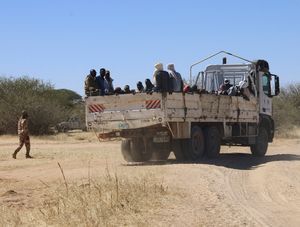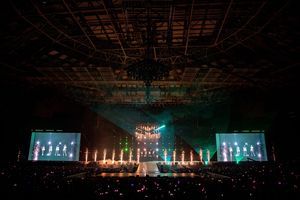![LG Display staff is introducing 'Pillar to Pillar (P2P)', a display solution for large vehicles (Courtesy of LG Display). © News1]](https://contents-cdn.viewus.co.kr/image/2025/07/CP-2023-0309/30841185.jpg) South Korea has long prided itself on being one of the few nations capable of fully leveraging the potential of artificial intelligence innovation. This national confidence is rooted in the country’s remarkable transformation from economic crisis to technological leadership – a journey that began in earnest during the aftermath of the Asian financial crisis in the late 1990s.
South Korea has long prided itself on being one of the few nations capable of fully leveraging the potential of artificial intelligence innovation. This national confidence is rooted in the country’s remarkable transformation from economic crisis to technological leadership – a journey that began in earnest during the aftermath of the Asian financial crisis in the late 1990s.
This surprising ranking has set off alarm bells among policymakers and industry experts alike. Many attribute South Korea’s lagging performance to policy missteps under the previous Yoon Suk Yeol administration, coupled with a persistent failure to overhaul outdated regulations. While the previous government emphasized more efficient use of research funds, it overlooked the critical need to improve the business environment for tech infrastructure – particularly regarding the construction and operation of data centers by both domestic and international firms.
As recently as early 2024, skepticism was widespread – even within government circles – about the notion that global competition to develop more powerful AI models would continue to escalate. Many also questioned whether South Korea truly needed to dramatically boost its computing power by securing more high-performance graphics processing units (GPUs), given the enormous costs involved.
These doubts were quickly dispelled. As AI development intensified globally, GPU prices skyrocketed amid fierce competition among tech giants. Companies like OpenAI, Google, Microsoft, Meta, Anthropic, and Alibaba began pouring unprecedented sums into expanding their data center capacity and equipping them with cutting-edge chips.
Despite this global momentum, debate persisted in South Korea.
Some policymakers argued that the country couldn’t feasibly compete with the world’s largest tech conglomerates in developing foundational AI models. Instead, they suggested focusing on building secondary applications – tools and services that leverage existing models – once the foundational development race had settled.
While this pragmatic approach had merit, it overlooked a crucial opportunity. Even if South Korea didn’t lead in model development, it could still become a vital AI hub by attracting global firms to build data centers within its borders.
The reality, however, is stark.
Cloudscene’s report found that Indonesia and Malaysia had 84 and 62 AI-ready data centers, respectively, compared to South Korea’s 43. This disparity is especially troubling given South Korea’s stronger standing in broader indices of technological and economic development.
President Lee’s ambitious AI policy
Fortunately, a new sense of urgency has emerged under President Lee Jae Myung’s leadership. Unlike his predecessor, Lee has recognized AI’s transformative power and the importance of establishing robust infrastructure to support it.
At a groundbreaking ceremony for a new data center in Ulsan – a joint venture between SK Group and Amazon Web Services – Lee drew a powerful parallel between the digital infrastructure of the future and the Gyeongbu Expressway of the past. That expressway, built in the 1960s amid widespread skepticism, played a crucial role in catalyzing South Korea’s industrial rise.
While Lee hasn’t announced a specific target for data centers to be built during his five-year term, he pledged during his campaign to procure 50,000 high-end GPUs. This would represent a massive leap forward, especially considering that only several thousand GPUs are believed to be currently operating across the country.
Equally significant is Lee’s vision to decentralize this new digital infrastructure.
Rather than concentrating development in the capital region, his administration aims to distribute data centers across various provinces. This strategy not only addresses the current AI computing capacity shortfall but also tackles one of South Korea’s most persistent social challenges: the overconcentration of population and economic activity in the Seoul metropolitan area. As of 2024, over 51 percent of the population lived in Seoul, Incheon, and Gyeonggi Province – an area comprising just 12 percent of the nation’s landmass.
Modern data centers have evolved far beyond basic storage facilities. Today, they serve as industrial-scale computational hubs essential for training, fine-tuning, and deploying advanced AI models. Establishing such facilities outside the capital region could help balance national development by generating jobs both directly and indirectly related to the AI industry.
According to the Korea Data Center Council, private-sector revenue from data centers is projected to grow by an average of 13 percent annually over the next four years – even before accounting for the anticipated expansion under Lee’s administration.
However, these gains will only materialize if structural challenges are addressed. Chief among them is the country’s aging and inefficient power grid system, which remains a bottleneck for large-scale AI infrastructure projects. In response, Lee has pledged to implement regulatory reforms and offer incentives to companies that locate new data centers near renewable energy sources in the provinces.
Still, the key lies in translating these promises into effective action. Reforming entrenched systems takes time, political capital, and cross-sector cooperation. Yet the urgency is undeniable. South Korea cannot afford to wait for the perfect moment. The global AI landscape is evolving rapidly.
For South Korea, the stakes are more than economic. They touch on national identity and the country’s ability to shape its future in an increasingly AI-driven world. Whether it emerges as a leader or falls behind may hinge on decisions made in the next few years. The groundwork is being laid – not just for faster computation, but for a new era of growth, equity, and innovation.
Yoo Choon-sikYoo Choon-sik worked for nearly 30 years at Reuters, including as the chief Korea economics correspondent, and briefly served as a business strategy consultant. The views expressed here are the writer’s own. – Ed.









Most Commented